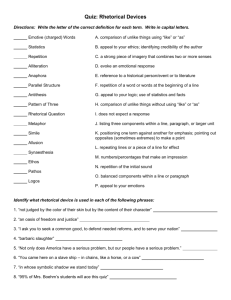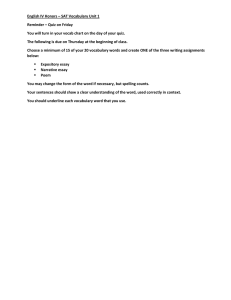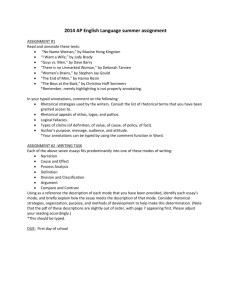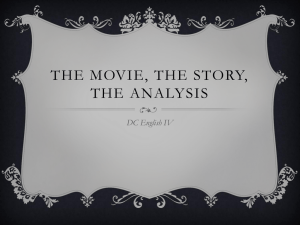Vocabulary List 11 – Quiz Jan 16 or 17 Antithesis – a rhetorical
advertisement
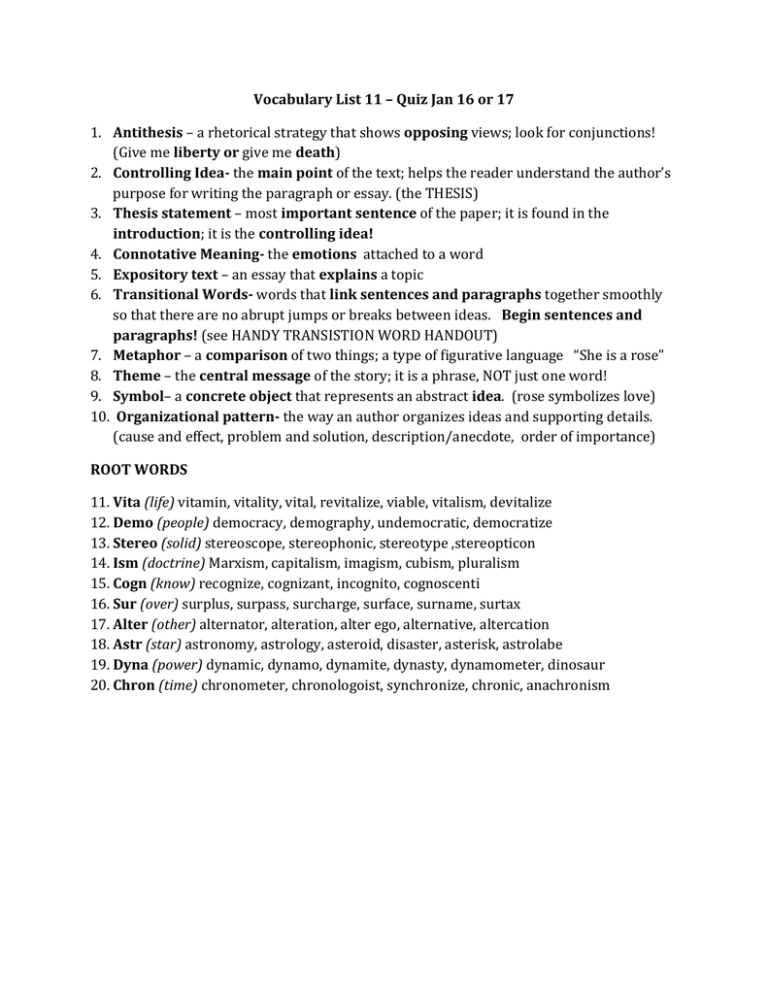
Vocabulary List 11 – Quiz Jan 16 or 17 1. Antithesis – a rhetorical strategy that shows opposing views; look for conjunctions! (Give me liberty or give me death) 2. Controlling Idea- the main point of the text; helps the reader understand the author’s purpose for writing the paragraph or essay. (the THESIS) 3. Thesis statement – most important sentence of the paper; it is found in the introduction; it is the controlling idea! 4. Connotative Meaning- the emotions attached to a word 5. Expository text – an essay that explains a topic 6. Transitional Words- words that link sentences and paragraphs together smoothly so that there are no abrupt jumps or breaks between ideas. Begin sentences and paragraphs! (see HANDY TRANSISTION WORD HANDOUT) 7. Metaphor – a comparison of two things; a type of figurative language “She is a rose” 8. Theme – the central message of the story; it is a phrase, NOT just one word! 9. Symbol– a concrete object that represents an abstract idea. (rose symbolizes love) 10. Organizational pattern- the way an author organizes ideas and supporting details. (cause and effect, problem and solution, description/anecdote, order of importance) ROOT WORDS 11. Vita (life) vitamin, vitality, vital, revitalize, viable, vitalism, devitalize 12. Demo (people) democracy, demography, undemocratic, democratize 13. Stereo (solid) stereoscope, stereophonic, stereotype ,stereopticon 14. Ism (doctrine) Marxism, capitalism, imagism, cubism, pluralism 15. Cogn (know) recognize, cognizant, incognito, cognoscenti 16. Sur (over) surplus, surpass, surcharge, surface, surname, surtax 17. Alter (other) alternator, alteration, alter ego, alternative, altercation 18. Astr (star) astronomy, astrology, asteroid, disaster, asterisk, astrolabe 19. Dyna (power) dynamic, dynamo, dynamite, dynasty, dynamometer, dinosaur 20. Chron (time) chronometer, chronologoist, synchronize, chronic, anachronism Vocabulary List 12 – Quiz on January 23 or 24 1. Rhetorical Strategy- a technique that an author uses to influence or persuade an audience. 2. Concession – respectfully acknowledging the other side’s opinion; a rhetorical strategy 3. Counter argument- follows a concession; strongly refutes (disagrees)the other side’s opinion; a rhetorical strategy 4. Call to action – a request by the writer to move the reader to take action 5. Authors Purpose- the author’s intention for writing (P I E persade, inform, entertain) 6. Audience- the intended group for a message 7. Tone – author’s attitude toward a subject 8. Ethical appeal – ethos; appealing to a person’s morals (right and wrong) 9. Emotional appeal – pathos; appealing to a person’s feelings 10. Logical appeal – logos; appealing to a person’s sense of reasoning (thoughts) ROOT WORDS 1. hyper (over) hyperactive, hyperventilate, hyperbole, hypertension 2. luna (moon) lunar, lunatic, lunate, luna moth, lunette, sublunar, lunular 3. octa (eight) octameter, octagenarian, octagon, octarchy, octave, octapus, octahedror 4. gyro (turn) gyration, gryoscope, gyre, gyrate, spirogyra, gyromagnetic, gyrocompas 5. contra (against) contadict, contary, contrast, contapuntal, contraband, contravene 6. geo (earth) geography, geothermal, geology, geophysics, geometry, geosynchronol 7. helio (sun) helios, heliotropic, heliocentric, heliograph, perihelion, aphelion 8. thermo (heat) thermostat, thermos, thermotropic, thermonuclear, thermocouple 9. tetra (four) tetrameter, tetrahedron, tetroxide, tetragon, tetrachloride, tetracycline 10. meter (measure) thermometer, millimeter, octameter, hydrometer, odometer Plus 5 words from list 11 Vocabulary List 13 – Quiz on January 30 or 31 1. Substantiated opinion - a personal belief that can be verified, proven, confirmed 2. Unsubstantiated opinion - a personal belief that cannot be verified, proven, or confirmed. 3. Inference- a logical guess made by connecting bits of information. 4. Critique- holds and/or expresses opinions, takes a position 5. Claim- a writer’s opinion that is proven with evidence. 6. Reliable Source- credible or believable source. (.edu and .org) 7. Compound sentence – two complete sentences joined together by a semi-colon; conjunction or adverb conjunction. 8. Complex sentence – a sentence created by connecting an independent clause and a subordinate clause. 9. Appositive Phrase – a noun the renames the name that precedes it. (my teacher, Ms. Miles) 10. Infinitive Phrase – the word “to” followed by a verb. (to run; to smile; to think) ROOT WORDS Scope – look (telescope, microscope, horoscope) Son – sound (sonar, song, unison) Dec – ten (decade, decimal, decatholon) Stell – star (stellar, constellation, interstellar) Amat – love (amateur, amigo, amorous) Germ – vital (germicide, germinate, Germ-X) Greg – group (gregarious, segregate, congregate) Mar – sea (maritime, marina, marinate) Prim – first (primary, prima donna, prime) Pyro – fire (pyre, pyromaniac, pyrotechnic) PLUS 5 WORDS FROM LIST 12 WEEK 14 VOCABULARY LIST – quiz on Monday, Feb 10 1. 2. 3. 4. 5. Anecdote – a brief narrative offered as an example to support a claim. Connotative diction – words full of emotion Shift – a sudden change (shift in tone; shift in setting; shift in point of view) Situational irony – when an outcome is different than what is expected Overstatement – an exaggerated statement; hyperbole (I have told you a million times!) 6. Reflexive pronouns – refers back to the subject of the sentence; ends with “self” or “selves” (himself, herself, ourselves) 7. Conclusion – the final section of the essay; meant to bring closure and leave a lasting impression 8. Imagery – author’s words or phrases that appeal to the five senses 9. Oxymoron – two opposite words placed together to emphasize a comparison 10. Verbal irony – when a character’s words contradict his actions or former words ROOT WORDS Clam – cry (clamorous, exclamation, clamor) Plu – more (plus, plural, plurality) Tang – touch (tangible, tango, intangible) String – bind (stringent, stringer, astringent) Liber – free (liberty, liberate, liberal) Junct – join (conjunction, juncture, adjunct) Clud – close (exclude, conclude, include) Se – apart (segregation, separate, secret) Trib – pay (tribute, retribution, contribute) Dign – worthy (dignitary, indignity, dignity) PLUS 5 WORDS FROM LIST 13
